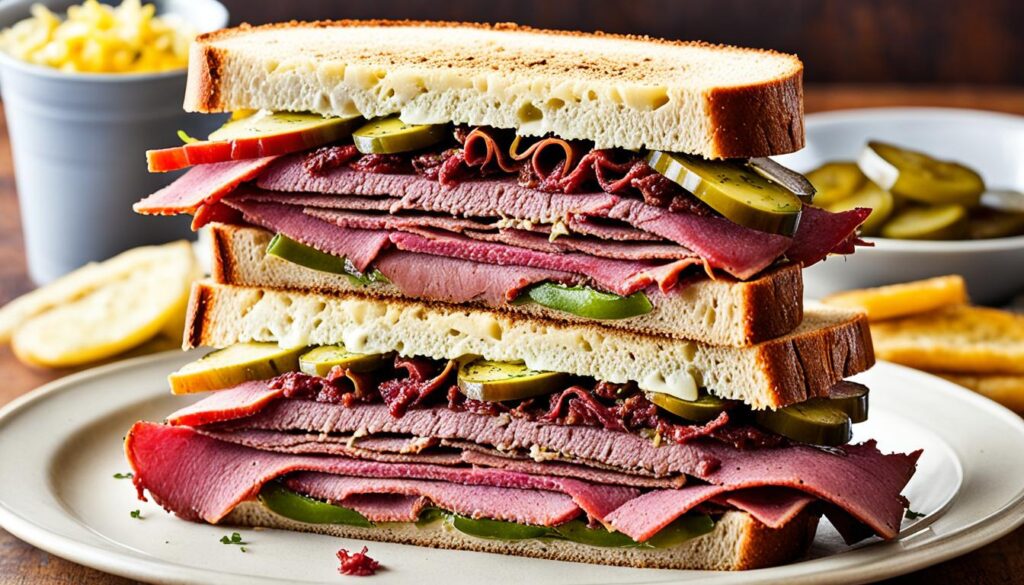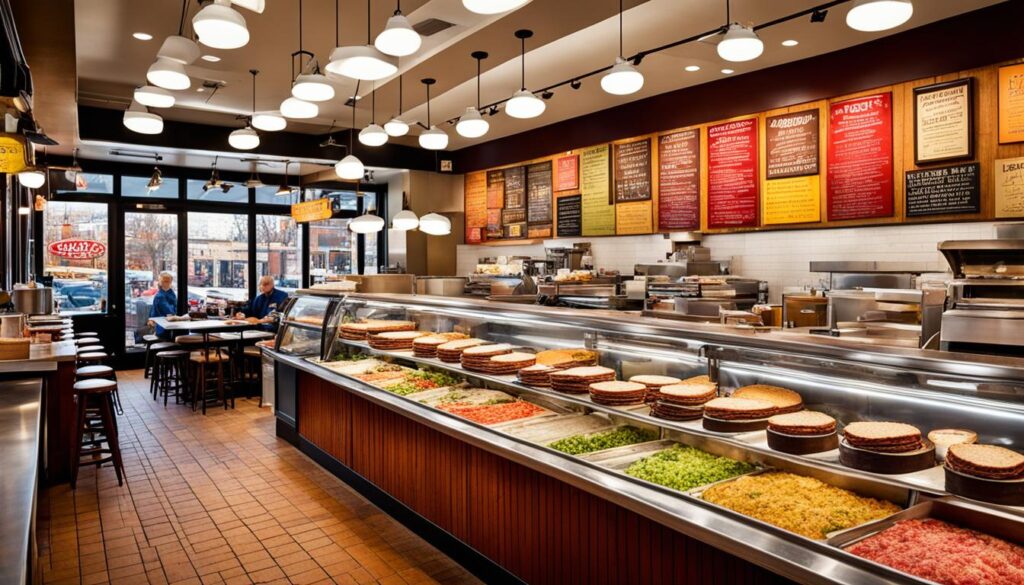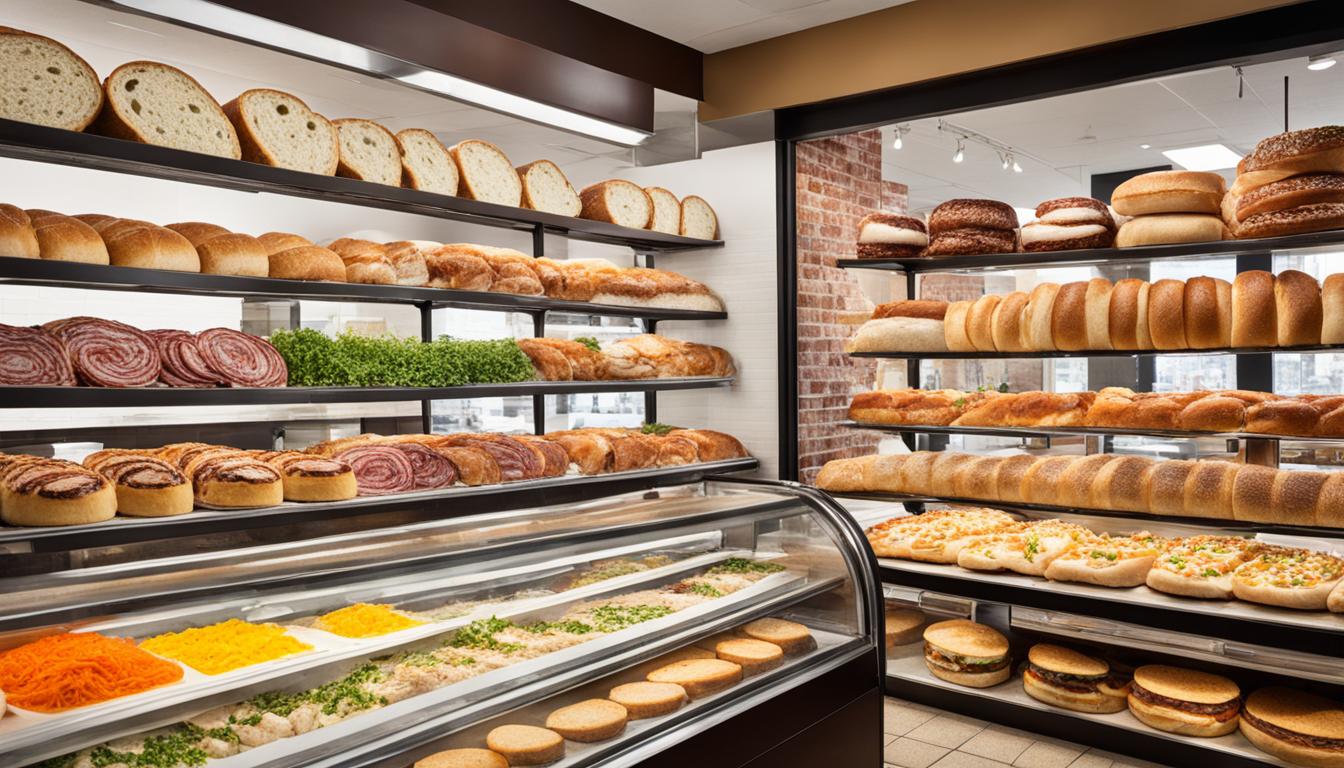Welcome to our ultimate guide to Jewish deli food! Have you ever wondered about the origins of Jewish delicatessen cuisine? Or maybe you’re curious about how to recreate those iconic deli sandwiches and dishes at home. Whether you’re a fan of pastrami, corned beef, or matzo ball soup, this guide is for you!
In this article, we will take you on a journey through the history of Jewish delis, exploring the traditions and flavors that have made them a beloved part of American food culture. We’ll also dive into the process of making iconic dishes like pastrami and corned beef, providing you with recipes and cooking techniques to try in your own kitchen.
But it doesn’t stop there. We’ll also introduce you to a variety of traditional Jewish deli dishes, from chopped chicken liver to knishes and gefilte fish. And if you’re looking for a modern twist on these classics, we’ve got you covered too, with a glimpse into the world of contemporary Jewish delis and their innovative dishes.
Are you ready to explore the flavors and heritage of Jewish deli cuisine? Join us as we celebrate the iconic Jewish deli fare that has captivated food lovers for generations. Let’s get started!
The Origins of the Jewish Delicatessen
The Jewish delicatessen has a rich history that dates back thousands of years. It originated with the ancient Hebrews, who developed a tradition of consuming pickled meat after a ritual animal sacrifice. This tradition of preserved and flavorful meats paved the way for the concept of the modern Jewish deli we know today.
In the 19th century, German and Alsatian immigrants brought the delicatessen culture to the United States. These immigrants opened kosher shops that specialized in cured and spiced meats, such as pastrami and corned beef, which would soon become iconic dishes of Jewish delis. Their expertise and culinary traditions laid the foundation for the vibrant Jewish deli culture in America.
As more Eastern European Jews migrated to the United States, the Jewish deli became a central gathering place for the community. It served as more than just a place to enjoy a meal; it became a symbol of assimilation and a celebration of Jewish culinary traditions.
Today, the Jewish deli continues to thrive and evolve, paying homage to its German and Alsatian roots while incorporating flavors and influences from other cultures. From New York to Los Angeles, Jewish delis across the country carry on the legacy of their founders, offering a taste of history and tradition to all who walk through their doors.
The Deli Classics: Pastrami and Corned Beef
When it comes to Jewish deli cuisine, two dishes stand out as iconic classics: pastrami and corned beef. Let us take you on a flavorful journey through these beloved deli favorites.

Pastrami is a mouthwatering creation made from beef brisket. The process begins with brining the brisket in a mixture of salt, spices, and a secret blend of seasonings. After the brining process, the meat is smoked to perfection. Finally, it is steamed or braised until tender, resulting in a melt-in-your-mouth richness. Pastrami is traditionally served on rye bread with a generous slathering of spicy mustard.
Corned beef, another staple of Jewish delis, is made by curing beef with salt and spices. The curing process infuses the meat with incredible flavors, creating a moist and succulent texture. Thinly sliced corned beef is commonly used to make sandwiches but is also a star ingredient in traditional dishes like corned beef hash.
Both pastrami and corned beef reign supreme on Jewish deli menus around the world. Their unique flavors and textures have made them beloved by food lovers of all backgrounds. Whether you prefer the boldness and smokiness of pastrami or the tender indulgence of corned beef, these deli classics are sure to satisfy.
Traditional Jewish Deli Dishes
In addition to the mouthwatering pastrami and corned beef sandwiches, Jewish delis also offer a delightful array of traditional dishes that are sure to tantalize your taste buds. These beloved classics encompass the rich and diverse flavors of Jewish cuisine, showcasing the cultural heritage and culinary expertise that make Jewish delis so beloved.
The Appetizer Delights:
- Chopped Chicken Liver: A savory delicacy made by sautéing chicken livers, onions, and seasonings to create a creamy and flavorful spread. Served with freshly baked bread or crackers, this dish is a beloved starter that perfectly encapsulates the essence of Jewish deli fare.
Comforting Soups and Savory Pastries:
- Matzo Ball Soup: Also known as “Jewish penicillin,” this comforting chicken broth soup features light and fluffy matzo ball dumplings. The matzo balls are made from matzo meal, eggs, and oil, resulting in a satisfying dish that warms both the body and soul.
- Knishes: These savory pastries are filled with a variety of flavorful fillings, such as mashed potatoes, onions, and even meat. These handheld delights are perfect for on-the-go snacking or as a side dish to complement your main meal.
The Pinnacle of Deli Tradition:
- Gefilte Fish: A traditional Jewish dish made from ground fish, usually whitefish or carp, mixed with matzo meal, onions, and seasonings. Served chilled and accompanied by tangy horseradish sauce, gefilte fish is a staple at festive occasions and a testament to the rich culinary heritage of Jewish delis.
These traditional Jewish deli dishes are steeped in history and reflect the diverse flavors and cultural significance of Jewish cuisine. Whether you’re savoring a bowl of comforting matzo ball soup, indulging in a knish bursting with savory goodness, or enjoying authentic chopped chicken liver, each bite is a delightful celebration of Jewish culinary heritage.
Modern Twists on Deli Favorites
While traditional Jewish delis are known for their classic dishes, contemporary Jewish delis are embracing innovation and pushing the boundaries of deli cuisine. These modern delis are introducing exciting twists on beloved favorites, offering a refreshing take on Jewish deli fare.
At these contemporary Jewish delis, you’ll find an array of innovative deli dishes that will tantalize your taste buds. Chefs are experimenting with unique flavor combinations and creative ingredient pairings to create dishes that are both delicious and unexpected.
Let’s explore some of the exciting modern twists you might find at a contemporary Jewish deli:
Vegan Deli Options
- With the growing popularity of plant-based eating, many modern Jewish delis are catering to the demand for vegan options. These delis offer vegan versions of classic deli dishes, such as plant-based pastrami made from seitan or tempeh, or dairy-free versions of traditional Jewish favorites like latkes or noodle kugel. These vegan deli options provide a great alternative for those following a plant-based diet or looking to reduce their meat consumption, while still enjoying the flavors and textures of Jewish deli cuisine.
Innovative Sandwiches
- Contemporary Jewish delis are reinventing the traditional deli sandwich by incorporating unique ingredients and flavor profiles. You might find sandwiches that combine unexpected fillings like smoked salmon with wasabi aioli or pastrami with pickled pineapple. These innovative flavor combinations add a modern twist to the classic deli sandwich and provide an exciting culinary experience.
Salads and Sides with a Twist
- In addition to sandwiches, modern delis are also elevating their salad and side dish offerings. You might encounter creative salads made with unique ingredients like roasted beets with citrus vinaigrette or quinoa with roasted vegetables. These contemporary twists on traditional deli sides offer a refreshing and health-conscious option to complement your meal.
Whether you’re a vegan, an adventurous eater, or simply looking to try something new, contemporary Jewish delis have something to offer. With their innovative deli dishes, these delis are redefining Jewish deli cuisine while staying true to its rich flavors and traditions.
So, the next time you visit a Jewish deli, don’t be afraid to venture beyond the traditional classics. Explore the modern twists on deli favorites and indulge in the exciting flavors that contemporary Jewish delis have to offer.
Recreating Jewish Deli Recipes at Home
If you’re feeling inspired to bring the flavors of the Jewish deli into your own kitchen, there are plenty of recipes and cooking techniques to try. From making your own pastrami or corned beef from scratch to mastering the art of matzo ball soup or latkes, recreating deli classics at home can be a fun and rewarding experience. Many traditional Jewish deli recipes have been passed down through generations, and with a little practice and patience, you can create your own deli feast in the comfort of your own home.
Why not begin your culinary adventure by making your own homemade deli meats? Start with pastrami, which involves brining and seasoning beef brisket and then smoking it to perfection. You can find various recipes online that walk you through the process step by step. The end result is a mouthwatering pastrami that rivals the deli counter.
To complement your homemade pastrami, try your hand at crafting corned beef. This flavorful cured meat is traditionally made by brining beef with salt and spices. Once again, there are numerous recipes available online for you to follow, guiding you through the process of creating tender and delicious corned beef at home.
Don’t forget to explore the wide range of traditional Jewish deli dishes that you can recreate in your own kitchen. If you’re a fan of chopped chicken liver, you can find recipes that will guide you in making it from scratch. Master the art of matzo ball soup, the ultimate comfort food, or impress your friends and family with homemade knishes and gefilte fish.
For those with a sweet tooth, don’t overlook the classic Jewish favorites like rugelach and babka. Look up recipes for these delightful pastries and dive into the world of Jewish baking.
As you experiment with homemade deli recipes, remember to embrace the Jewish deli cooking techniques that have been refined over generations. Whether it’s the process of curing and smoking meats or the delicate art of shaping perfect matzo balls, these techniques are essential to capturing the authentic flavors of Jewish deli cuisine.
So gather your ingredients, sharpen your knives, and get ready to embark on a culinary journey. With a little time and effort, you can recreate the flavors and experience of a Jewish deli right in your own home. From the aroma of freshly baked bread to the rich and savory flavors of homemade pastrami, your kitchen will become a hub of authentic Jewish deli cuisine.
Exploring Jewish Delis Near You
One of the best ways to experience the flavors and atmosphere of a Jewish deli is to visit one near you. Whether you’re in New York City, Los Angeles, or another city with a Jewish deli presence, there are likely several options to choose from. From historic institutions that have been serving deli classics for decades to modern delis with a contemporary twist, you can explore the diverse offerings of Jewish deli cuisine in your own neighborhood.
When searching for the best Jewish delis in your area, there are a few methods you can use. Start by checking out online review platforms, such as Yelp or Google Reviews, to see what others have to say about the delis in your vicinity. Pay attention to the overall rating, as well as individual feedback and comments about specific dishes. You can also ask friends, family, or colleagues for their recommendations, especially if they have tried Jewish delis in your area before.

Once you have a list of potential options, take the time to explore their menus and websites. Look for signature dishes like pastrami sandwiches, corned beef plates, and traditional Jewish sides. Some delis may also offer vegetarian or vegan options, ensuring that there’s something for everyone to enjoy. Make note of any unique twists or modern adaptations of classic deli dishes, as these can provide a fresh and exciting culinary experience.
Our Favorite Jewish Delis in [Your Area]
- [Jewish Deli Name 1]: Known for their mouthwatering pastrami sandwiches and pickled delights, [Jewish Deli Name 1] has been a local favorite for over [number] years. Don’t miss their homemade matzo ball soup!
- [Jewish Deli Name 2]: If you’re in the mood for a modern take on Jewish deli classics, be sure to check out [Jewish Deli Name 2]. Their innovative flavor combinations and unique twists will leave you craving for more.
- [Jewish Deli Name 3]: With a history dating back to [year], [Jewish Deli Name 3] is a true institution in the [Your Area] Jewish community. Their traditional recipes and old-world charm make every bite a nostalgic experience.
Remember, visiting a Jewish deli is not just about the food; it’s also about immersing yourself in the culture and history of Jewish cuisine. Take the time to appreciate the decor, listen to the conversations happening around you, and soak in the atmosphere that makes each Jewish deli unique. So, go ahead and explore the best Jewish delis in your area. From the traditional to the contemporary, these culinary gems are waiting to delight your taste buds and provide a glimpse into the vibrant world of Jewish deli cuisine.
Tips for Ordering at a Jewish Deli
Ordering at a Jewish deli can sometimes be an overwhelming experience, especially if you’re new to the deli scene. But don’t worry, we’ve got you covered with a few tips and tricks to help you navigate the menu and make the most of your deli visit.
- Familiarize yourself with deli lingo: It’s important to know the difference between a pastrami sandwich and a corned beef sandwich, or understand what “extra lean” or “fatty” means when it comes to deli meat. Take some time to familiarize yourself with the terminology so you can confidently order your desired dish.
- Be prepared for peak hours: Jewish delis can get busy, especially during lunchtime. Be prepared to wait in line, and if the deli offers a take-out option, consider placing an order in advance to save time.
- Ask for recommendations: Don’t be afraid to ask the deli staff for their recommendations. They are experts in their cuisine and can help guide you toward the most popular or delicious options on the menu.
- Embrace the deli experience: Ordering at a Jewish deli is not just about the food, it’s about immersing yourself in the atmosphere and culture. Take a moment to appreciate the sights, sounds, and smells of the deli, and enjoy the unique experience of being part of this culinary tradition.
So, next time you find yourself at a Jewish deli, remember these tips and embrace the deli experience. With a little knowledge of deli lingo, some patience during busy times, and a willingness to explore new flavors, you’ll be able to confidently order and enjoy the delicious dishes that await you.
Celebrating the Iconic Jewish Deli Fare
The Jewish delicatessen is a beloved institution that holds a special place in American food culture. It represents the culinary traditions and history of the Jewish community, from the early days of Jewish migration to the United States to the modern innovations in deli cuisine. The iconic Jewish deli food, such as pastrami sandwiches and matzo ball soup, continues to be cherished by food enthusiasts of all backgrounds.
Every bite of iconic Jewish deli food is a celebration of not only the delicious flavors but also the rich heritage and sense of community that are ingrained in the Jewish deli culture. The dishes served at these delis honor the time-honored Jewish food heritage, passed down through generations, and bring people together to share a meal.
Whether you’re savoring a traditional deli dish or exploring modern twists on familiar flavors, indulging in the iconic Jewish deli fare is an experience that connects us to our history and evokes a sense of nostalgia. So, the next time you visit a Jewish deli, take a moment to appreciate the flavors, the stories, and the vibrant Jewish deli culture that continue to shape our culinary landscape today.
